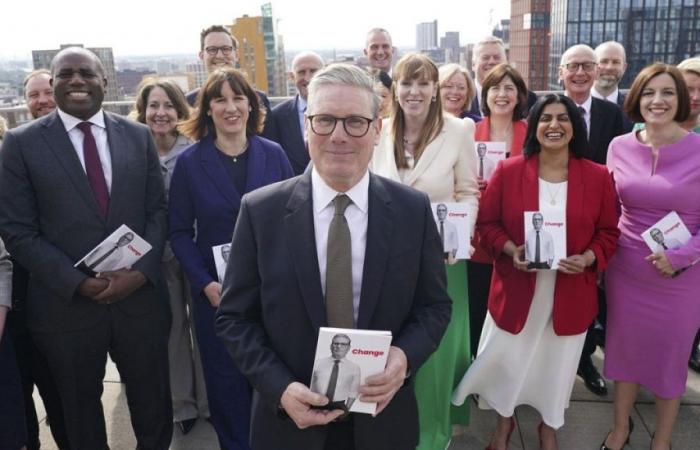Labor leader Keir Starmer has ruled out any radical overhaul of UK-EU relations but made clear his dislike of Boris Johnson’s post-Brexit arrangements
ADVERTISING
The Labor Party and its current leader, Keir Starmer, could be set to lead the UK after 14 years in opposition.
According to the latest YouGov poll, the centre-left opposition party is clearly ahead of the governing conservatives in next week’s general election in the UKwith 36 percent of the vote compared to 20 percent for the Conservatives.
For many in Brussels, Labour’s surge in popularity has raised a number of questionsincluding the possibility of the party rethinking its decision to leave the EU, confirmed by the 2016 Brexit referendum.
Starmer has ruled out any radical transformation of UK-EU relations, particularly the UK’s return to the fold, but He spoke out in favor of strengthening trade and security ties.
For Labour, returning to the European Union is not on the table
After the UK’s official exit from the EU in 2020, even a possible Labor government would not be inclined to have second thoughts about Brexit.
Despite the campaign in favour of remaining in the EU, Starmer has publicly hardened his approach and ruled out a return to the single market or the customs union, thereby rejecting any commitment to fully restore freedom of movement between the UK and Europe to pre-Brexit levels.
He also rejected calls from his own party, made by London Mayor Sadiq Khan, to create a new visa agreement for young workers who move between the UK and the EU for four years and re-enter the Erasmus student exchange programme.
Joël Reland, of the think tank UK in a Changing Europe, told Euronews that this attitude could be due to electoral caution, as the party tries to maintain its majority in the polls and avoid attacks from the Tories.
However, Starmer criticized London’s policies towards the EUsaying the post-Brexit deal under Boris Johnson was “botched” and that the UK could do better.
Its Shadow Chancellor of the Exchequer, Rachel Reeves, recently explained that the UK will seek a less “adversarial” approach to negotiations with the EU, focusing on trade agreements in specific sectors.
The Labour Party’s election manifesto includes the easing of border controls to address the cost of food productsassistance to touring artists and mutual recognition of professional qualifications.
Labor wants to restore relations between London and Brussels
The problem for Starmer is trying to bring the United Kingdom – and its economy – back into the European Union in a way acceptable to Brussels, without alienating the sympathies of sections of the British population who voted to leave.
“Labour will have to present a really clear proposal, otherwise the EU will not have much incentive to come to the table negotiations because, frankly, he has a long list of higher priorities,” Reland told Euronews.
With the prospect of the UK moving closer to the EU, officials in Brussels may agree to deals that would be advantageous for the UK economically, but which would not normally be granted to a third country that is officially outside the Union.
“The second challenge is about political compromises, because any deal will involve a large degree of alignment with EU regulations, and this poses quite clear political risks for a Labor government,” Roeland added.
For example, one of the requirements requested by Brussels is that the United Kingdom has supervision of the European Court of Justice – the Supreme Court of the European Union for community law – to be able to sign a new agreement on the export and import of animal products or products intended for animal consumption (feed, for example), which could irritate potential Eurosceptic voters.
Furthermore, what Labor is willing to concede in future negotiations with Brussels may depend on the size of their majority, should they come to power.
The Labor Party’s position on Ukraine
The Labor Party has made clear that it is committed to NATO and the defense of Ukraine, like its Conservative rivals.
Dr Patrick Bury, a former NATO analyst and defense and security expert, told Euronews that Labour’s approach to the military alliance is likely to be one of “continuity rather than change”.
Labor wants to maintain the Conservative government’s commitment to spend 2.5 per cent of GDP on defence. However, having inherited an economy that is struggling with high inflation, a Labor government would find itself in need deal with fiscal constraints regarding defense spending.
In its manifesto, the party highlighted Germany and France as two countries with which it is likely to seek to rebuild security and defense relations.






